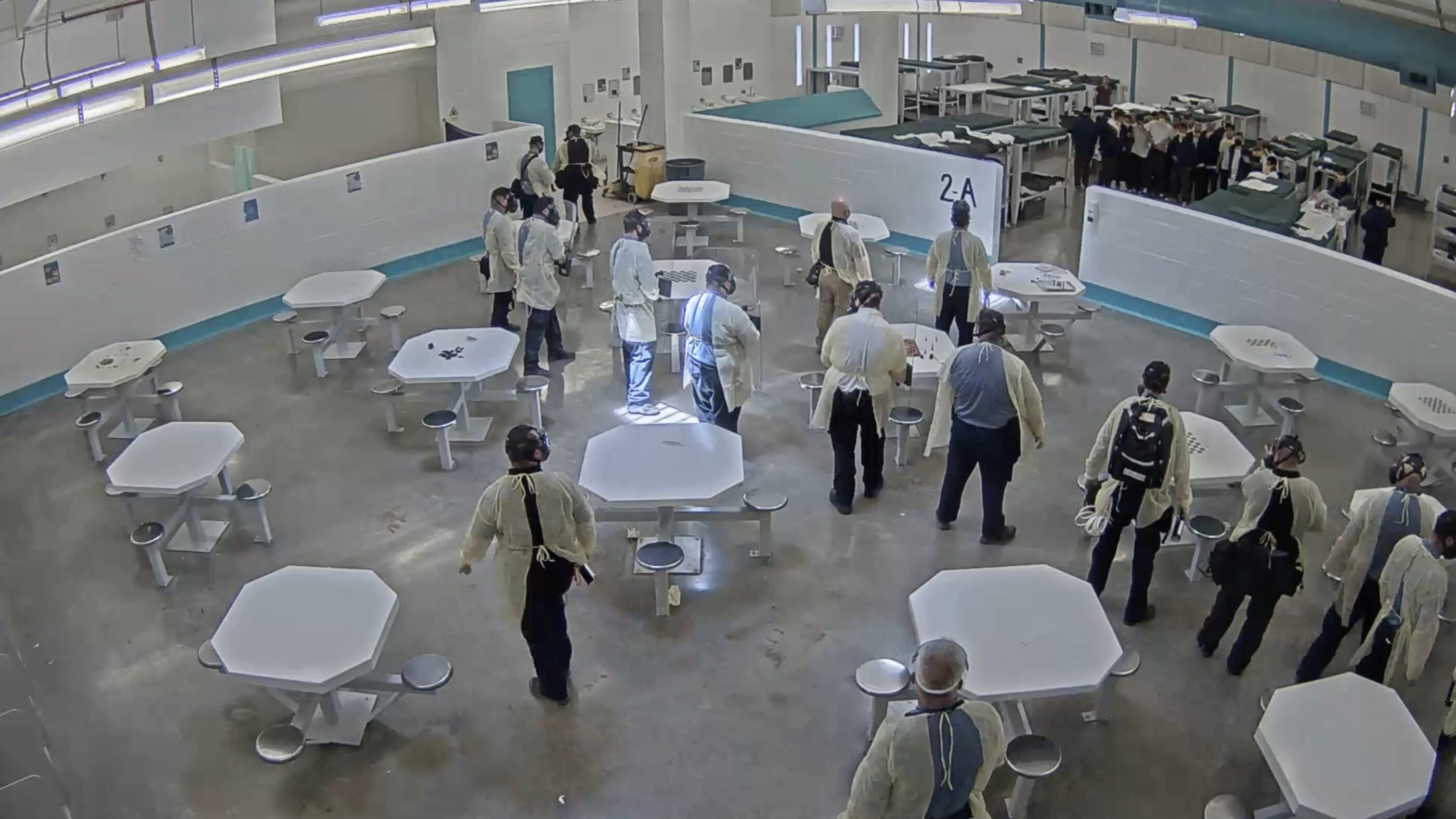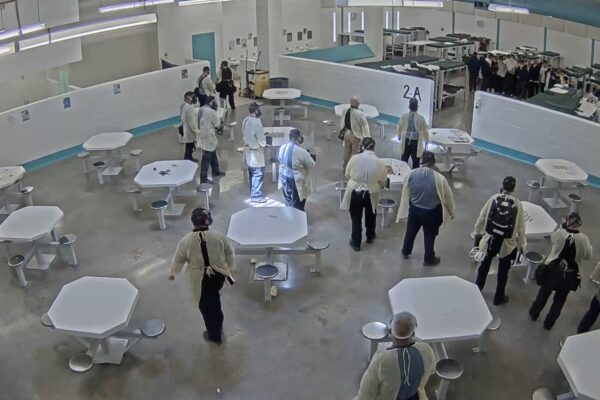ESTANCIA, NM — A report published earlier this year by a government watchdog exposed shockingly unsanitary conditions and severe understaffing at the Torrance County Detention Facility.
The report, a rare management alert issued by the Department of Homeland Security’s Office of Inspector General (OIG) in March, called for the immediate removal of all immigrants detained at the facility. It garnered national attention and triggered visits from a member of Congress as well as calls by advocacy groups for the release of immigrants detained at the facility.
But newly-published documents and interviews with nearly a dozen people currently or recently detained at Torrance show conditions at the facility are much worse than previously reported. Medical staffing shortages are so severe even basic medical care is hard, if not impossible, to obtain and the facility’s infrastructure is so degraded cells routinely flood with human excrement from broken pipes.
“This is the worst place I've ever been as far as treatment,” said Edward Merayo, 45, who was transferred to Torrance in July 2021. “I’ve never been in a place so run down.”
Torrance County has contracted with the federal government to detain people on behalf of both U.S. Immigration and Customs Enforcement (ICE) and the U.S. Marshals Service. The county in turn has hired CoreCivic, one of the largest for-profit prison companies in the country, to hold these federal detainees at Torrance, which CoreCivic operates. Interviews with people detained by the Marshals Service show problems identified by the OIG are facility-wide and often much worse than previously reported.
Even basic infrastructure issues take months to get fixed – if they get fixed at all.
“I’ve never been in a place so run down.”
“I’ve never ever had to wait three months to have a toilet fixed and I’ve been in Maricopa County, in Joe Arpaio’s jail,” Merayo said, referencing the notorious former Arizona sheriff who ran a jail Arpaio himself called a concentration camp.
These documents and interviews also highlight the unwillingness of U.S. Immigration and Customs Enforcement (ICE) and CoreCivic to fix conditions at Torrance. ICE and CoreCivic have instead repeatedly ignored and whitewashed conditions at the facility, even as newly-publicized documents show that the federal agency in its direct communications with the company disputed its excuses for dangerously low staffing levels.
Conditions at Torrance could have catastrophic consequences, particularly given CoreCivic’s documented disregard for safety and its history of retaliation when the people in its custody object to abhorrent conditions. In 2020, a peaceful hunger strike over conditions at Torrance in the midst of the COVID-19 pandemic ended when CoreCivic staff used pepper spray on protesters trapped indoors.
Staffing Shortages
Among the most severe problems identified in the OIG alert was understaffing, which had “led to safety risks and unsanitary living conditions” at the facility. But this wasn’t the first time CoreCivic had been put on notice for low staffing levels. In July 2021, Torrance failed its annual inspection from the Nakamoto Group, the notoriously lax inspectors contracted by ICE to audit its detention centers.
Nakamoto Group inspectors in their report noted that at the time Torrance’s “current staffing level is at fifty percent of the authorized correction/security positions. Staff is currently working mandatory overtime shifts.”
Documents obtained by the ACLU of New Mexico via public record requests show the company and ICE had been fighting over understaffing at the facility even before that Nakamoto Group inspection, since at least 2020.
The documents, consisting primarily of communications between ICE and CoreCivic personnel, paint a stark picture. As of Dec. 24, 2020, nine out of roughly 34 healthcare positions at Torrance were vacant, including a physician job that by then had been vacant for 139 days. An advanced registered nurse practitioner position had also been vacant for nearly 7 months, and an administrative clerk position for more than a year. Another nursing position was by then vacant for nearly 9 months.
In response, CoreCivic sought to underplay the vacancies, saying the facility was sufficiently staffed for what were at that time lower population levels. CoreCivic’s contract with ICE guaranteed the company will be paid for 724 beds per day, no matter how many people are actually detained there, at a cost of roughly $2 million a month. ICE eventually docked CoreCivic’s pay for Torrance by 10 percent per month due to this severe understaffing. In March 2022, ICE increased that penalty to 25 percent and lowered the facility’s guaranteed capacity from 724 people to 505.
While the contract discrepancy report was mentioned in the OIG alert, the documents behind the original pay reduction have not been previously released.
The staffing shortage does not appear to be improving. Reports on the facility published by Rep. Melanie Stansbury’s office show that on April 20, the facility had 150 employees and 80 vacancies. By June, the reports say the facility only has enough staff for ICE to detain 300 people. By July 8, the most recent report available, the facility had 124 employees on staff and 81 vacancies.
Security Concerns
Among the documents obtained by the ACLU of New Mexico were also back-and-forth letters between Torrance’s Acting Warden Michael Sedgwick and ICE Contracting Officer’s Representative Glenn Westcott. They show how CoreCivic’s inability to hire qualified staff for its facility, which is about an hour east of Albuquerque, has had national repercussions.
CoreCivic operates 47 correctional and detention facilities nationally. During the height of the COVID-19 pandemic, which resulted in devastating outbreaks among staff and people detained in prisons around the U.S., the company’s Chief Medical Officer Dr. Keith Ivens was busy working 40 hours a week as the on-call physician at Torrance.
“If there’s not enough corrections officers, that means somebody could lose their life.”
Based on information obtained by the ACLU of New Mexico as part of a medical neglect lawsuit out of Torrance, Ivens is the acting medical director for the facility, overseeing medical care from his home in Tennessee. ICE’s Westcott also noted in a letter dated Jan. 5, 2021, that some medical staff was “floating” between multiple ICE detention centers including the Cibola County Correctional Center, located in Grants, New Mexico.
That raised deeply troubling questions about who was overseeing the medical response for a national private prison company during the biggest public health emergency in nearly a century. It also, according to Westcott, represented a security risk.
“This practice of charging full price at each facility and providing part time coverage at best leads to violations in PSU security procedures,” Westcott wrote, seemingly referencing ICE’s Personnel Security Unit. “I have been having problems with the same Corporate floating medical staff trying to come into the facility without any security clearance or a clearance assigned to another facility.”
After the publication of the OIG alert, CoreCivic turned to temporary, out-of-state correctional guards, according to multiple people detained at Torrance who have interacted with the officers. The officers, from states including Texas and Georgia, are known as TDY or travel duty employees. As of July 8, there were 22 travel employees at Torrance, according to Stansbury’s reports.
Staff shortages have been so severe that on multiple occasions the facility has not had enough correctional officers on hand to take people to their legally-mandated yard time.
“It’s very dangerous to run a facility like that,” said Tyree Mitchell, 43, who was transferred to Torrance in November. “If there’s not enough corrections officers, that means somebody could lose their life.”
Inadequate Medical Care
Despite Ivens’ direct involvement, people detained at Torrance in the custody of the Marshals Service say healthcare at the facility is abysmal, with serious medical needs going unaddressed for days.
"I don’t want to go waste time with the medic and come back with nothing."
Jesus Varela, 27, has mental and physical health issues stemming from being kidnapped when he was 8 years old, during which his back was burned, possibly with some type of acid. He eventually started receiving a pill to help him sleep and bring back some appetite because he’s been losing weight.
“They just tell me, ‘go exercise, read books,’” said Varela, who’s been detained at Torrance by the Marshals Service since July 2021. “I don’t ask for help because I just come out with things they’ve already told me.”
He says he needs things like a thicker mattress, better shoes, and insoles, otherwise he’s constantly in pain – usually about a four on a scale of one to 10 but sometimes it gets to a seven or eight when he’s been sitting for too long. He’s given up on trying to get medical help and is instead trying to fix things himself.
“I don’t want to go waste time with the medic and come back with nothing,” he said. “I got some shoes that I bought here.”
He still hasn’t been able to get insoles, although he’s seen other people get them.
One Haitian migrant seeking asylum in the U.S., who the ACLU of New Mexico is not naming to protect their identity, lost an estimated 40 lbs over the roughly two months they spent detained at Torrance. The only time they saw a medical provider was shortly before being released when they seemed on the verge of a medical emergency. In November, the ACLU of New Mexico and other advocacy organizations filed an oversight complaint regarding due process violations and inhumane conditions for Haitian migrants detained at Torrance.
"I don’t want to go waste time with the medic and come back with nothing."
Not even during the pandemic have medical care standards improved at Torrance. Merayo was diagnosed with COVID-19 and had to quarantine with his whole housing unit. He said he received no medication to help with a severe case, and after 14 days he was let out of quarantine without any retesting.
“I was in like a fever-induced coma for like 5 days,” he said. “I slept for five days straight because my fever and headache was so bad I couldn’t get out of bed.”
“Here they want to fix everything with an Advil.”
Particularly troubling for many of the people interviewed is the lack of adequate dental care. Basic, outpatient procedures like fillings or new dental crowns are not available, with dental staff telling the people detained that company policy prohibits them.
Instead, they were offered one single procedure: anesthesia-free dental extractions. Those whose dental problems didn’t yet merit an extraction — which could’ve been addressed with basic, timely interventions — were told to wait and come back once their problem was severe enough for a dentist to remove their tooth.
“I have a bad tooth and they want to pull it instead of putting a filling or a crown on it, they don’t care if it can be fixed,” Varela said. “Here they want to fix everything with an Advil.”
A lack of dental care is not simply an issue of aesthetics or comfort. Research has repeatedly shown that a lack of appropriate dental care leads to long-term health issues. Oral health has been linked to heart disease, pneumonia and diabetes.
CoreCivic’s repeated inability to appropriately staff Torrance extends far beyond its medical department, in ways that people inside say places them at constant risk. In a Jan. 26, 2021 letter, ICE’s Westcott alerted CoreCivic that the contract discrepancy report could be expanded “to include other staffing areas that are currently showing critical shortages.”
The critical medical understaffing, Westcott wrote, “places in question the [Torrance County Detention Facility’s] operational capability.”
Cleaning and Unpaid Labor
One workforce CoreCivic has not hesitated to turn to for the basic cleaning work required to run Torrance are the people detained there.
Nearly everyone in Marshals Service custody in Torrance interviewed by the ACLU of New Mexico shared a similar experience. Sometime in the previous six to 12 months, they were transferred from the CoreCivic-owned Cibola County Correctional Center to Torrance.
"We started a running joke about it every time they moved us, ‘Oh they need another pod cleaned.’”
There, they found a detention facility in a shocking state of disrepair. Toilets were clogged, sinks were broken, and wastewater with human refuse covered the floor of the common spaces as well as individual cells. The smell, many said, was overwhelming.
Torrance’s housing areas are separated into multiple pods, each of which typically contains a common space where people can mingle during the day — unless a lockdown or some other restriction is in place — as well as cells that can hold two individuals and which have their own toilet and sink.
As they arrived at their pod, the new residents had to clean it themselves. They only had some basic cleaning supplies provided by CoreCivic, and in some cases resorted to old t-shirts and towels and their own shampoo to clean.
Once they had completely cleaned their pod, they said, CoreCivic moved them to a new pod where they would once again encounter inhumane conditions and disrepair. There, the pattern would repeat itself, with people cleaning the pods and cells before being relocated to a new, dirty pod.
Merayo said he and others were moved multiple times from pod to pod without explanation, every time finding the pods “horribly filthy.”
“Every single time we’ve had to clean the pod … the toilets were clogged, sinks were clogged, we had trouble with maintenance,” he said. “There was no explanation, we started a running joke about it every time they moved us, ‘Oh they need another pod cleaned.’”
There are broken showers and black mold in the facility, and he said they were not provided bleach to clean the mold. A crew with a power washer came by just once, unlike in other facilities where that cleaning happens regularly.
Normally, people in Torrance performing cleaning duties should be paid between $5 and $7 a day for their work, they said.
"The living situation is disgusting...the water we drink is disgusting as well."
“They didn’t give us anything, they just used us to clean,” Varela said.
When they started hearing about an upcoming inspection, they were told to hurry up and clean.
“The day before they were like ‘Come on, come on get cleaning … and we’ll bring you pizza,’” he said, adding that in his experience they were promised pizza on three different occasions. “They only brought us pizza one time, the rest they were just pulling our chain.”
People detained at Torrance are protected by federal anti-trafficking laws that prohibit forced labor.
Current Conditions
Since the March release of the OIG alert, people detained in Torrance say staff have been implementing often cosmetic and inadequate measures to create the impression of a well-run facility.
The hallway floors, they say, are often obsessively polished ahead of inspections. The facility has also begun installing railing and step ladders on bunk beds, which raises questions about why such basic safety measures were ignored until after the OIG inspection.
But many of the whitewashing efforts have had virtually zero practical impact.
Jorge Zubiate-Rascon, 50, was transferred in Marshals Service custody to Torrance in July 2021. He worked in the kitchen where he said two faucets that were replaced after the inspection are already leaking again.
A portion of the kitchen floor was peeling, so staff recently painted over it. But they used the wrong type of paint, he said, and multiple people have slipped and fallen over the patched section. That paint, he added, is already peeling.
“If I, who isn’t an inspector, can see that these things are bad,” Zubiate-Rascon said, “how can they say that it’s fine?”
“I’ve been in other places and prison is never good for anybody. But there are places where they treat you like a person instead of treating you like an animal.”
The list of glaring deficiencies in Torrance is extensive: the air ducts — which are regularly checked for drugs and contraband but not for their condition — are dirty and rotting. Toilets throughout the facility and in individual cells are clogged, overflow or leak. Maintenance requests go ignored for weeks or months or are entirely unaddressed.
Among the most concerning is the previously unreported prevalence of broken cell doors. During morning rounds, correctional officers will automatically unlock all cell doors in a pod, people in Marshals Service custody said. But multiple cell doors are malfunctioning, remaining locked until an officer with a key manually unlocks them.
Varela, who is in a cell with a broken door, said he often spends between 30 minutes to an hour trapped in his cell while others in his pod try to flag down a correctional officer to unlock his door. The officers never proactively notice the repeated failures unless they’re doing a round. When people try to communicate out through the call buttons inside their cells, they go entirely ignored — the only time people interviewed had ever seen the buttons in action is when officers wanted to communicate with each other.
“If there had been an emergency … that button doesn’t do anything,” he said.
These failures represent a fundamental threat to the health and well-being of the people inside Torrance.
“I’ve been in other places and prison is never good for anybody,” Varela said. “But there are places where they treat you like a person instead of treating you like an animal.”
That was echoed by multiple people inside the facility, who said it was perhaps the worst prison in the state. Even some travel duty correctional officers, multiple people said, have commented how they can’t wait to get back to their home states because the conditions and management of Torrance are so bad.
“The living situation is disgusting, some of these cells, the sinks are always stopped up, the shower is disgusting, the water we drink is disgusting as well,” Mitchell said. “They treat us like we’re animals.”





